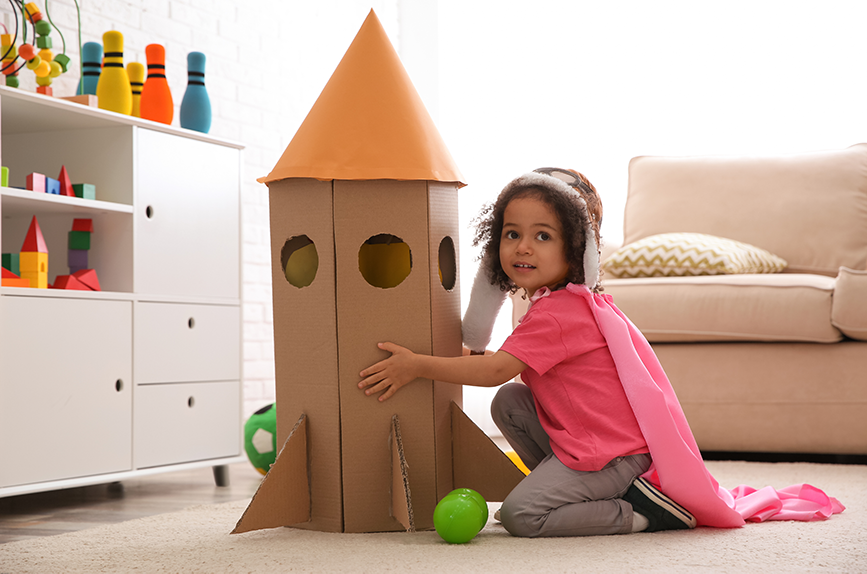Published June 10, 2020 and based on a June 2015 blog post by Kristina Collins.
The Importance of Play over the Summer
If you’re like most parents or caretakers, you’re probably scrambling to fill up the summer break with activities and summer learning to keep your children busy while they are out of school. With restrictions for and closures of schools, summer camps, and recreational businesses due to the COVID-19 pandemic, your children's summer might be less scheduled than usual.
This opportunity for free play can actually be beneficial for your kids' development and summer learning! Some research suggests that you can put down your daily planner and embrace unstructured free play. Unstructured play is often undervalued, but it actually results in children increasing their executive functions, which control and manage cognitive processes. This executive functions include working memory, impulse control, decision-making, troubleshooting, and organizational skills they need for a successful future.
So, if your kids aren’t busy all day, every day, this summer with swimming and tennis lessons, day camp, dance classes, sports activities, or summer school, don’t sweat it! They'll be able to develop important cognitive skills all on their own.
The University of Colorado published a study finding that unstructured play improves executive functions, confirming the value of just letting children play. The researchers found that children who engage in free play are more likely to work independently as students, establish their own goals, and concentrate better. These are all skills especially important in remote learning, when teachers or parents may not be available to call students’ attention back to the task at hand if they lose focus.
Now, what does unstructured play mean?
Unstructured Play versus Structured Play

Remember when you were a child and created a fort by pushing chairs together and arranging sheets or blankets across them? That is only one example of free or unstructured play. When children let their imaginations run wild and pretend that a living room chair is a car they are driving to another country, they are engaging in free play. Having a backyard campout is another example when children can make their own plans and rules.
Examples of structured play are things like swimming classes, dance lessons, and sports activities. The events happen at defined times and places and are generally led by adults. Even board games fall into this category, since the children are expected to follow the games' established rules. If, instead, children create their own board game and use their freedom to create their own rules, the play would be unstructured.
Summer learning often involves reading books, and avid readers may consider reading their favorite book to be play. In that case, reading would be structured play. Kids and teens writing their own story and turning it into a book that they make and illustrate themselves is unstructured, or free, play.
Tangible Benefits of Free Play
The American Academy of Pediatrics (AAP) has long advocated for children to spend more time in free play. Specifically, the AAP states: “Play is essential to development because it contributes to the cognitive, physical, social, and emotional well-being of children and youth. Play also offers an ideal opportunity for parents to engage fully with their children.” Some of the benefits of free play discussed by the AAP include:
- Practicing decision-making skills.
- Discovering their interests and passions.
- Assuming adult roles where they can control outcomes and overcome fears.
- Working with other children in groups.
- Negotiating, decision-making, and creating rules for games with their peers.
- Promoting health through physical activity.
- Reducing stress.
- Learning the value of social bonds by interacting with other children.
- Building self-confidence since they are in charge.
- Learning self-direction. (This may be the most valuable lesson children learn from free play!)
Join in at Playtime!
Parents should also spend time playing with their children. If your child wants to play “restaurant” and tells you to be the diner, play along and enjoy watching them create a menu, take your order, and bring you pretend food. If your children invite you in to their blanket fort, go in and enjoy eating s’mores by the pretend campfire.
Have fun with your children as you encourage and participate in their unstructured play, knowing that they are developing valuable skills that will help them in the classroom and throughout their lives.
Key Takeaways for Summer Learning
- Don’t stress about lining up structured activities for your children this summer if you don't have those options. If they are available, avoid overbooking children with structured activities.
- Free play helps children develop valuable life skills, such as the executive functions of decision-making and impulse control.
- Summer learning doesn't have to only take the form of worksheets and computer learning programs. Children need unstructured play to develop learning skills, like working memory and focus.
- Get involved! Let your children lead the activities during unstructured playtime.
The most efficient way of developing executive functions is with proven technology, like the Fast ForWord program. Learn more about executive function in general and how Fast ForWord can help by watching the on-demand webinar, "Let's Focus: Developing Executive Function from Kindergarten through High School." Watch it now.

